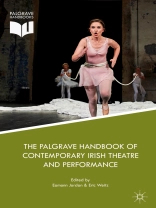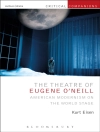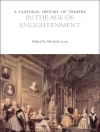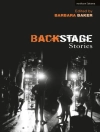This Handbook offers a multiform sweep of theoretical, historical, practical and personal glimpses into a landscape roughly characterised as contemporary Irish theatre and performance. Bringing together a spectrum of voices and sensibilities in each of its four sections — Histories, Close-ups, Interfaces, and Reflections — it casts its gaze back across the past sixty years or so to recall, analyse, and assess the recent legacy of theatre and performance on this island. While offering information, overviews and reflections of current thought across its chapters, this book will serve most handily as food for thought and a springboard for curiosity. Offering something different in its mix of themes and perspectives, so that previously unexamined surfaces might come to light individually and in conjunction with other essays, it is a wide-ranging and indispensable resource in Irish theatre studies.
表中的内容
1. Introductions/Orientations.- 2. The Mainstream: Problematising and Theorising; Shaun Richards.- 3. The Theatre Royal, Dublin; Conor Doyle.- 4. The Politics of Performance: Theatre in and About Northern Ireland; Lisa Fitzpatrick.- 5. The Literary Tradition in the History of Modern Irish Drama; Christopher Murray.- 6. #Waking The Feminists; Carole Quigley.- 7. Live Art in Ireland; Una Mannion.- 8. Gestures of Resistance: Dance in 1990s Ireland; Finola Cronin.- 9. Contemporary Theatre in Irish Language; Máirtín Coilféir.- 10. Theatre for Young Audiences in Ireland; Tom Maguire.- 11. Performance in the Community: Amateur Drama and Community Theatre; Elizabeth Howard.- 12. Performing Politics: Queer Theatre in Ireland, 1968-2017; J. Paul Halferty.- 13. Long Flame in the Hideous Gale: The Politics of Popular Irish Performance, 1950-2000; Susanne Colleary.- 14. Other Theatres; Christopher Collins.- 15. Independent Theatre and New Work; Gavin Kostick.- 16. Funding, Sponsorship and Touring; Shelley Troupe.- 17. New Century Theatre Companies; Cormac O’Brien.- 18. The Joyful Mysteries of Comedy; Bernard Farrell.- 19. Lambert Theatre and Puppetry Redefined; John Mc Cormick.- 20. Scenic Transitions: From Drama to Experimental Practices in Irish Theatre; Noelia Ruiz.- 21. Key Moments and Relationships: Working with Pat Kinevane; Jim Culleton.- 22. Irish Cinema and Theatre; Ruth Barton.- 23. Actor Training Ireland since 1965; Rhona Trench.- 24. Ireland: A Designer’s Theatre; Siobhán O’Gorman.- 25. Props at the Abbey; Eimer Murphy.- 26. Ireland: An Actor’s Theatre; Bernadette Sweeney.- 27. The Figurative Artist: ÚNA’N’ANU; Úna Kavanagh.- 28. Ireland: A Director’s Theatre; Ian R. Walsh.- 29. In the wake of Olwen Fouéré’s
riverrun; Kellie Hughes.- 30. Ireland: A Writer’s Theatre; Nicholas Grene.- 31. The Making of
Mainstream; Rosaleen Mc Donagh.- 32. Participatory Performance: Spaces of Creative Negotiation; Kate Mc Carthy and Una Kealy.- 33. Other Spaces (Non-Theatre Spaces); Charlotte Mc Ivor.- 34. Irish Plays in Other Places; Kevin Wallace.- 35. Adaptation and Transformation; Anne Fogarty.- 36. Circuitous Pathways: Marina Carr’s Labyrinth of Feminist Form in the US World Premiere of
Phaedra Backwards; Melissa Sihra.- 37. Being Intercultural in Irish Theatre and Performance; Cathy Leeney.- 38.
Once Upon a Time in the Life of Arambe: A Personal Reflection; Bisi Adigun.- 39. Intercultural Arrivals and Encounters with Trauma in Contemporary Irish Drama; Eva Urban.- 40. Dramaturgical Complicity: Representing Trauma in Brokentalkers’ Blue Boy; Kate Donoghue.- 41. Between the City and the Village: Liminal Spaces and Ambivalent Identities in Contemporary Irish Theatre; Brian Devaney.- 42. Verse in Twenty-First Century Irish Theatre; Kasia Lech.- 43. The Gate Theatre on the Road: O’Casey, Pinter and Friel; Mária Kurdi.- 44. Festivals and Curation; Willie White.- 45. Interart Relations and Self-reflexivity in Contemporary Irish Drama; Csilla Bertha.- 46. ’Contempt of Flesh’: adventures in the uncanny valley; Ashley Taggart.- 47. The Dance of Affect in Contemporary Irish Dance Theatre; Aoife Mc Grath.- 48. Artistic Vision and Regional Resistance:
The Gods Are Angry, Miss Kerr and the Red Kettle Theatre Company; Richard Hayes and Una Kealy.- 49. Cultural Materialism and a Class Consciousness?; Erica Meyers.- 50. The Utilisation of Domestic Space in the Reflection of Economic Struggles of Modern Living in Conor Mc Pherson’s New Translation of
The Nest; Maha Alatawi.- 51. Audiences: Immersive and Participatory; Ciara L. Murphy.- 52. Sounding Affect in Pan Pan Theatre’s Adaptation of
All That Fall; Angela Butler.- 53. Music in Irish Theatre: the sound of the people; Ciara Fleming.- 54. Sightings of Comic Dexterity; Eric Weitz.- 55. Acts of Remembering in Irish Theatre; Emilie Pine.- 56. Staging a Response:
No Escape and the rise of documentary theatre in Ireland; Luke Lamont.- 57. Children of the Revolution: 1916-2016; James Moran.- 58. Post-feminism and Ethical Issues in Four Post-Celtic Tiger Irish Plays; Mária Kurdi.- 59. Reflections on Bernard Shaw and the 21st Century Dublin Stage; Audrey Mc Namara.- 60. ’Endless Art’: The Contemporary Archive of Performance; Barry Houlihan.
关于作者
Eamonn Jordan is Associate Professor in Drama Studies at the School of English, Drama and Film, University College Dublin, Ireland. His published works include Theatre Stuff: Critical Essays on Contemporary Irish Theatre (2000) and Dissident Dramaturgies: Contemporary Irish Theatre (2010), and he has co-edited The Theatre of Martin Mc Donagh: A World of Savage Stories (2006) and The Theatre of Conor Mc Pherson: ‘Right beside the Beyond’ (2012) with Lilian Chambers.
Eric Weitz is Associate Professor in Drama and Theatre Studies at Trinity College Dublin, Ireland. His publications include The Cambridge Introduction to Comedy (2009) and Theatre & Laughter (2016), as well as edited collections and single-author essays and articles. He sits on the boards of two socially-engaged theatre companies – Smashing Times (Dublin) and Collective Encounters (Liverpool) – and he is President of the Irish Society for Theatre and Performance Research.












